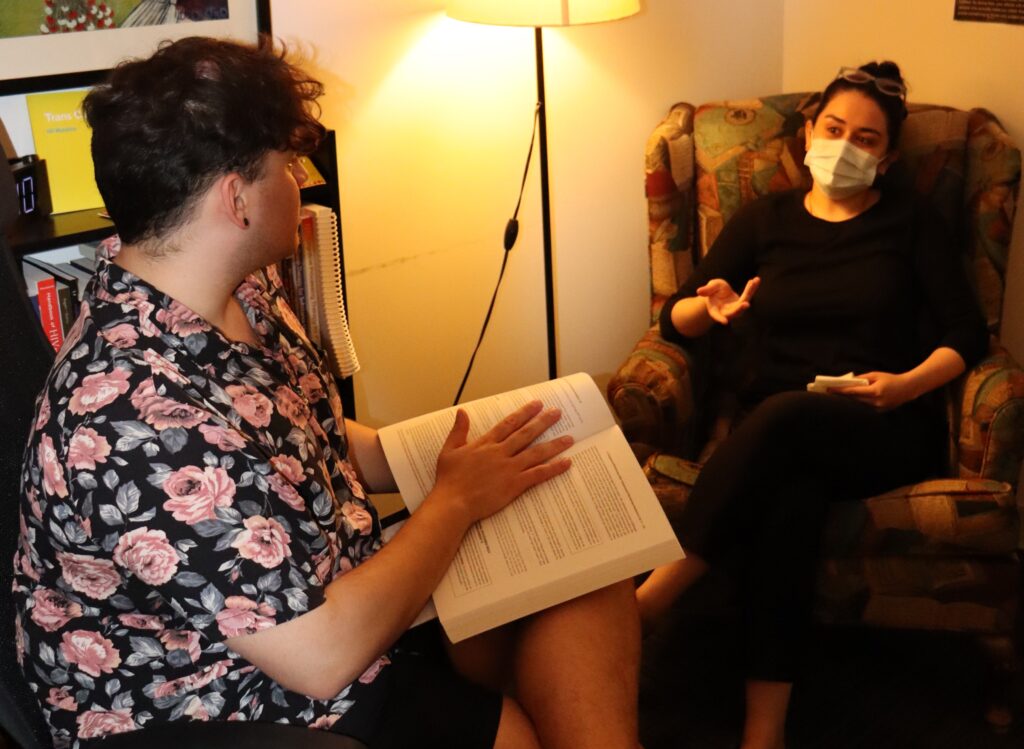Since its inception last Summer, ACT Mental Health Initial Assessment engaged over 220 service users.
Our initial assessment will be on pause this Summer to measure our achievements and plan for the rest of the year – we will resume in September 2024. If service users need mental health support during this time, they can join one of our drop-in groups or access some resources: ACT Support Groups, Mental Health Self-Guided Resources.
ACT provides free, confidential counselling about issues concerning HIV, sexual health, mental health and substance use. We offer counselling by staff who are experienced in HIV, sexual health, substance use and other psychosocial issues.

Principles and Values
ACT is committed to bio-psycho-social, collaborative, anti-oppressive, trauma-informed, and harm reduction-based approaches to help empower people living with HIV, those at risk for HIV and other STIs, friends, family members, as well as those affected by or concerned about HIV & AIDS.
ACT provides individual counselling services free of charge to those who have trouble accessing quality care due to poverty, sexism, gender identity, homophobia, biphobia, transphobia, racism, xenophobia, drug use and social isolation.
Eligibility
The criteria we use to determine eligibility for counselling is if you will benefit from talk therapy. Some of those criteria are:
- Are you stable enough to sit and talk for an hour about issues which bring up a lot of emotion?
- Are you stable enough between weekly or bi-weekly appointments to make it to sessions more times than not?
- Do you have diagnoses which require specialized manualized therapies and looking for us to provide them?
- Are you in crisis and need emergency support?
We are neither a hospital nor a clinic, which means we draw from a range of modalities and practice in a flexible way. Our criteria reflect our position as a non-hospital organization within our communities.
We are not set up to provide service users with immediate or ongoing crisis support. This means we may not be able to support service users every time they need it. If service users present in crisis, they will be referred to appropriate crisis support and other specialized services. Examples include medical attention, immediate housing or shelter support, and any medical or psychological emergency.
How To Access ACT Counselling Services
ACT offers scheduled counselling sessions. Counsellors can meet with you at ACT offices, over the phone, in other locations such as coffee shops, or via Zoom. There is no need to provide your real name if anonymity or confidentiality is a concern.

We use a stepped-care approach to assess service users’ needs during our Mental Health Initial Assessment.

Our Stepped Care model offers:
- Commitment to our communities’ main needs.
- Preventive and coordinated mental health support.
- Early intervention and effective access to mental health services.
Want to get more information or register to our Mental Health Services? Please email: MHSadminsupport@actoronto.org OR please visit our Bookings page at: ACT Mental Health Services (office365.com)

Guiding Principles of Counselling at ACT
Counselling at ACT values the following principles: you are in control of what you talk about, your counsellor will work collaboratively with you, and ACT counsellors value and respect your autonomy.
When you work with a counsellor at ACT, you will not be stigmatized for the sex you have or want to have, your HIV status, the person you are or want to be, the substances/drugs you use or want to use, and the experiences which inform who you are. You are welcome to bring all your complexity into counselling with you.

The therapeutic approaches of ACT counsellors:
ACT counsellors draw from a range of evidence-based therapeutic approaches, including Solution-Focused Brief Therapy (SFBT), Person-Centred Therapy, Narrative Therapy, Cognitive Behavioral Therapy (CBT), and Motivational Interviewing (MI), among others. You can expect an explanation as to which modalities your counsellor uses when you meet for the first time, and a discussion on which fits best for you. All counsellors at ACT place great importance on the relationship between you and them and take care to work with you from where you are at.